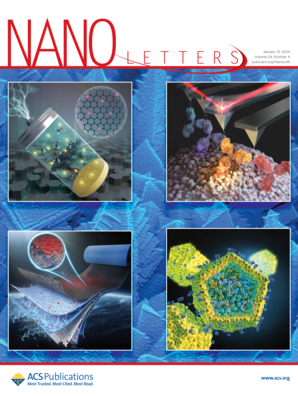Reconfigurable Neuromorphic Computing Using Methyl-Engineered One-Dimensional Covalent Organic Framework Memristors
IF 9.1
1区 材料科学
Q1 CHEMISTRY, MULTIDISCIPLINARY
引用次数: 0
Abstract
The rapid evolution of neuromorphic devices seeks to bridge biological neural networks and artificial systems, enabling energy-efficient and scalable computing for next-generation artificial intelligence. Herein, we introduce methyl-engineered one-dimensional covalent organic framework (1D COF)-based memristors as a transformative platform for reconfigurable neuromorphic computing. The incorporation of methyl groups enhances localized polarization effects within the COF framework, effectively mitigating random Ag+ migration/diffusion and stabilizing conductive filament morphology. This strategic modification yields devices with exceptional multilevel storage capabilities, exhibiting superior stability, linearity, and reproducibility. Moreover, the highly ordered architecture and customizable chemical environment of the methyl-functionalized 1D COF allows for precise control over resistive switching behaviors, facilitating the emulation of synaptic functions and the development of artificial neural network architectures. Demonstrating exceptional performance in neuromorphic tasks such as high-accuracy image recognition, these devices showcase significant promise as the foundation for energy-efficient, next-generation neuromorphic computing systems.

甲基工程一维共价有机框架记忆电阻器的可重构神经形态计算
神经形态设备的快速发展旨在连接生物神经网络和人工系统,为下一代人工智能实现节能和可扩展的计算。在这里,我们介绍了甲基工程一维共价有机框架(1D COF)为基础的忆阻器作为可重构神经形态计算的变革平台。甲基的加入增强了COF框架内的局部极化效应,有效地减轻了Ag+的随机迁移/扩散,稳定了导电丝的形态。这种战略性的修改产生了具有卓越的多级存储能力的器件,表现出卓越的稳定性、线性和可重复性。此外,甲基功能化1D COF的高度有序结构和可定制的化学环境允许精确控制电阻开关行为,促进突触功能的仿真和人工神经网络架构的发展。这些设备在高精度图像识别等神经形态任务中表现出色,为节能的下一代神经形态计算系统奠定了基础。
本文章由计算机程序翻译,如有差异,请以英文原文为准。
求助全文
约1分钟内获得全文
求助全文
来源期刊

Nano Letters
工程技术-材料科学:综合
CiteScore
16.80
自引率
2.80%
发文量
1182
审稿时长
1.4 months
期刊介绍:
Nano Letters serves as a dynamic platform for promptly disseminating original results in fundamental, applied, and emerging research across all facets of nanoscience and nanotechnology. A pivotal criterion for inclusion within Nano Letters is the convergence of at least two different areas or disciplines, ensuring a rich interdisciplinary scope. The journal is dedicated to fostering exploration in diverse areas, including:
- Experimental and theoretical findings on physical, chemical, and biological phenomena at the nanoscale
- Synthesis, characterization, and processing of organic, inorganic, polymer, and hybrid nanomaterials through physical, chemical, and biological methodologies
- Modeling and simulation of synthetic, assembly, and interaction processes
- Realization of integrated nanostructures and nano-engineered devices exhibiting advanced performance
- Applications of nanoscale materials in living and environmental systems
Nano Letters is committed to advancing and showcasing groundbreaking research that intersects various domains, fostering innovation and collaboration in the ever-evolving field of nanoscience and nanotechnology.
 求助内容:
求助内容: 应助结果提醒方式:
应助结果提醒方式:


